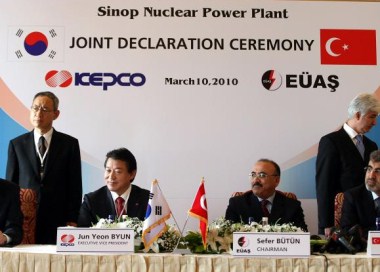Now Turkey for South Korean nuclear exports
11 March 2010
South Korea's ascent to the top level of nuclear nations has continued with prospective cooperation with Turkey and fresh determination to introduce reprocessing. However, political and commercial hurdles remain.
A deal signed in Istanbul yesterday will give Korea Electric Power Corporation (Kepco) five months to prepare a bid to build a four-reactor nuclear power plant at Sinop. If agreeable to Elektrik Üretim (EUAS), then the two countries would sign a civil nuclear power cooperation agreement to allow the firms to jointly realise the plan.
 |
| The scene in Istanbul yesterday |
A separate process is still underway which could see Turkey import Russian nuclear reactors. This is the surviving element of the government's last nuclear tender, which included conditions that most reactor vendors were unable to meet, leaving only one submission backed by the Russian state.
With four APR-1400 pressurized water reactors, the prospective Sinop plant would produce some 5800 MWe. The first APR-1400s are nearing completion at Shin-Kori in South Korea and the United Arab Emirates should have four in operation by 2020 after a landmark $20 billion deal last year - South Korea's first reactor export. Kepco has already approached the US Nuclear Regulatory Commission concerning licensing the design for use in America, but it is unclear how feasible North American sales are in the short term, given that Westinghouse retains certain intellectual property rights on the design and is very actively promoting it's own AP1000.
Meanwhile in the South Korean capital, Seoul, prime minister Chung Un-chan declared a desire to make imported nuclear fuel go further and reduce waste through reprocessing and recycling.
According to the Korea Herald, he told the Summit of Honour on Atoms for Peace and Environment, "Korea plans to develop advanced technology on establishing a nuclear fuel cycle so that the country could recycle spent atomic fuel for energy use and to reduce high-level radioactive waste."
This again is easier said than done. South Korea has a civil nuclear cooperation agreement with the USA that prohibits it from reprocessing and recycling, in line with US policies of recent decades that sought to reduce the amount of separated plutonium in the world. However, the USA is now beginning a review of used nuclear fuel management strategy and the re-introduction of these back-end techniques is a genuine possibility. Such a decision is at least two years away, but should it happen South Korea could begin negotiations for a new cooperation deal to replace the current one that expires in 2014, making reprocessing realistic perhaps at the end of this decade.
One of the main drivers for South Korea in developing a domestic nuclear energy sector is that the country has very few energy resources of its own. Compared to inevitable fossil fuel imports, nuclear fuel represents a valuable and reliable alternative. It currently provides about 40% of electricity and plans are in place to expand this to over 55% by 2030. Clearly, the benefits of re-using imported uranium and gaining 30% more energy from it while significantly reducing waste is attractive in this context.
Research and written
by World Nuclear News